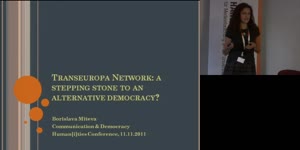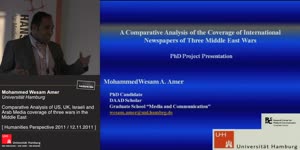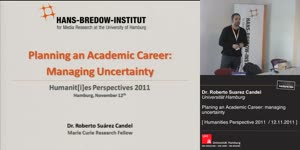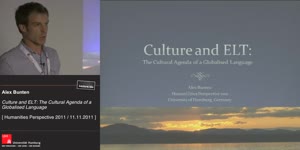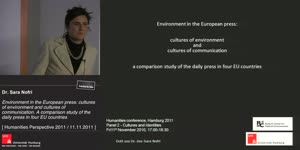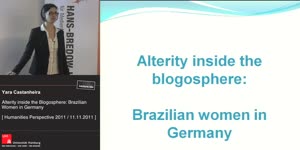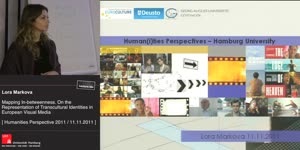Crisis & Risk Communication: Paradigms and the Paradoxes of Convergence and Divergence - Shameem Mahmud - Universität Hamburg
- Lecture2Go
- Videokatalog
- F.5 - Geisteswissenschaften
- Sonstiges
- Humanities Perspective 2011
Videokatalog
Crisis & Risk Communication: Paradigms and the Paradoxes of Convergence and Divergence
(Bangladesh)
“Crisis & Risk Communication: Paradigms and the Paradoxes of Convergence and Divergence”
mahmud.shameem(at)gmail.com
ABSTRACT: Communicating risk is as old as the human race. Since the pre-historic age people have developed and applied different methods, messages and signals for identification, prediction and communication of hazardous situations and risks. Some of these techniques and tools are still in use, which we call indigenous knowledge to respond natural hazards. On contrary, scientific studies about risk and crisis communication are a recent development that has been developed in the domains of science and social sciences only in the last three decades as a follow-up of public risk perception studies.
This paper provides an overview of major development of risk and crisis communication (an offshoot of risk communication) research with an attempt to categorise the state of knowledge of the subject in different historical and disciplinary paradigms. We will analyse the evolution of risk communication studies since the early 1980s when it has been transformed from the top-down linear process to the public participatory model. As the Internet and other new communication technologies grew, access, consumption and sharing of information among the public have been increased dramatically in recent years transcending barriers of time and space. In contemporary world, the academic and social debate about risk has been also mushroomed and we have found that risks associated with natural, technological, environmental, and health hazards are often interlinked. We are now witnesses to a paradoxical development of the characters and related discourses about risk issues and events. On one hand, there are trends of globalisation of risk events/issues as local risks and risk messages cross national borders. On the other hand, there are increasing discussions of localisation of (even global) risk messages for effective risk/hazard management at the local level. Accordingly, existing risk communication literature needs to be revised and we argue for a more converged approach by integrating knowledge of risk communication developed in the fields of natural, technological, environmental and health hazards. Simultaneously, risk and crisis communication approaches should also be diverged and addressed in socio-cultural and communication contexts of a certain locality or group of people.
BIO: Shameem Mahmud is a PhD candidate and Research Associate at the University of Hamburg. He studied Mass Communication and Journalism at the University of Dhaka, Bangladesh; and Journalism, Media and Globalisation at the Universities of Aarhus, Denmark; Amsterdam, the Netherlands; and Hamburg, Germany as an Erasmus Mundus student. His main research interests are in the areas of risk communication; social psychology of risk; media and public sphere, and new media and journalism. Mr. Mahmud worked as a journalist in Bangladesh from 1998 to 2005 and as a Lecturer in Journalism from 2005 to 2008.

